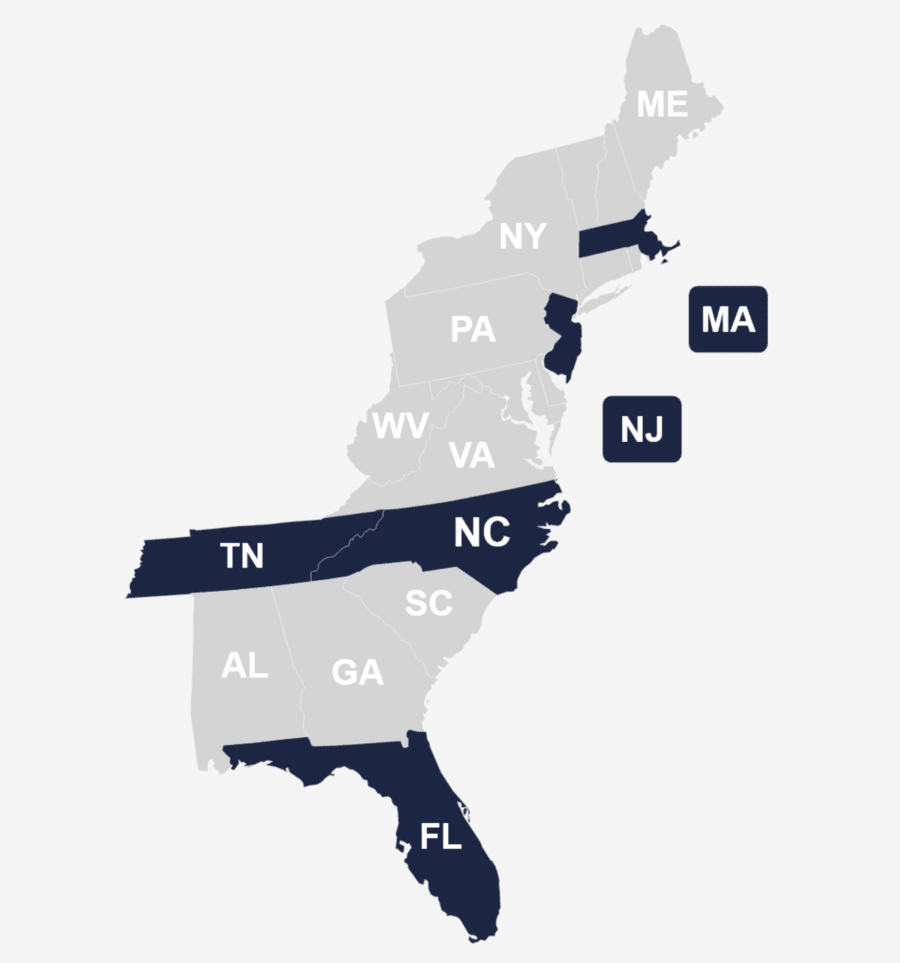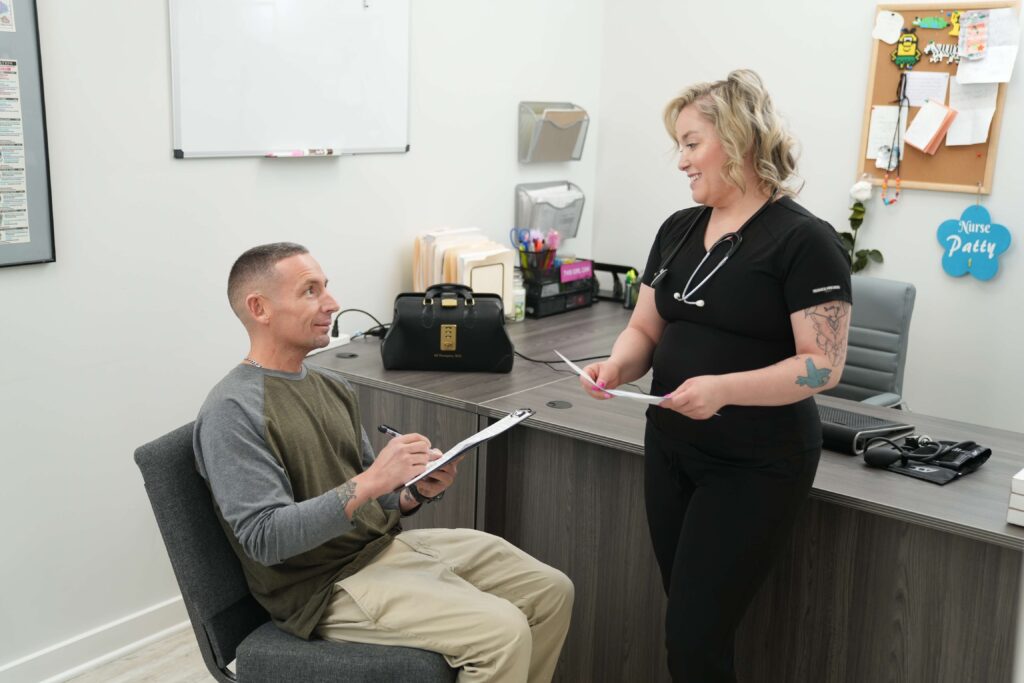Harmony Health Group Offers Dual Diagnosis Treatment Centers
As a top-tier treatment provider, the Harmony Drug and Alcohol Recovery Group has 10 different treatment facilities located within Florida, Massachusetts, North Carolina, New Jersey, and Tennessee. We are passionate about providing personalized care, including holistic dual diagnosis treatment that prepares you for your upcoming recovery and mental health journey.
With our treatment centers, you will have access to dual-diagnosis and co-occurring treatment options. Because there are unique differences between the different mental health disorders that can be experienced, there is no standard treatment approach for mental health care. We can provide you with the support and guidance you need to live your best life through our multidisciplinary teams. Dial (866)461-4474 to learn about our available treatment options today!
Understanding Dual Diagnosis and Co-Occurring Disorder
Let’s take a moment to clarify the difference between dual diagnosis and co-occurring disorders. Though these two phrases are often used interchangeably, they have different meanings. Dual diagnosis is used to describe individuals who are living with a substance use disorder in conjunction with another mental health concern. This can include depression, anxiety, PTSD, borderline personality disorder, and bipolar disorder.
Individuals who are living with co-occurring disorders are living with two different mental health disorders, one of which may, or may not, be a substance use disorder. Dual-diagnosis is not used to describe individuals living with two mental health concerns that do not include at least one substance use disorder. Some individuals may have an idea of which mental health disorder was present first, and others may not. The development of mental health disorders is an individualized experience influenced by genetics, our environment, and life experiences including trauma and abuse.
Dual Diagnosis Disorder Statistics in the United States
Does Your Insurance Cover Dual Diagnosis Treatment?
You can check your insurance coverage levels by calling us on: (866) 461-4474
We’re here to listen. Let’s talk today.
How Much Does Dual Diagnosis Treatment Cost Without Health Insurance?
Without insurance, dual diagnosis treatment costs will cost more than the national average of an inpatient rehab program, which is $50,469. Integrated treatment approaches can include specialized treatment experiences, and individual therapy that may extend the length of your treatment stay. Treatment costs will be influenced by the mental health disorder itself, as well as the severity of symptoms experienced.
As the preferred treatment for those living with a dual diagnosis, dual diagnosis treatment programs can include integrated mental health and addiction care. This means you’re your care program will include treatment for all of your mental health concerns to ensure you receive the proper support and treatment. Appropriate treatment options are often available in inpatient rehab programs, partial hospitalization programs, and intensive outpatient programs.
Is Co-Occurring or Dual Diagnosis Treatment Worth Paying For?
Absolutely, 100%! Receiving treatment for all of your mental health concerns is the most effective way to find emotional wellness. Co-occurring disorder rehabs and dual diagnosis programs provide you with integrated behavioral care to help you learn to cope with and manage your mental health symptoms.
We understand that many individuals have concerns about dual diagnosis care expenses because it does tend to cost more than treatment for one mental health concern. The downside to this thinking is that you still have a mental health concern that was left untreated, which can harm your overall health and wellness. Since dual diagnoses are often intertwined, there is a strong chance that struggling concern with one concern will lead to struggling with both. In that situation, you may then need additional treatment, which could cost more than dual diagnosis treatment would have cost originally. The Harmony Health Group can help you understand your insurance coverage by completing our verification form today!

Dual Diagnosis Treatment Centers That Offer Payment Plans and Work with Insurance Providers
The Harmony Alcohol and Drug Addiction Recovery Group offers holistic dual diagnosis treatment in various treatment settings, including both inpatient and outpatient treatment programs. If you are curious about our personalized treatment programs, we encourage you to contact one of our compassionate team members now by calling (866)461-4474!
Treatment Centers in Florida (FL) That Offer Payment Plans
Treatment Centers in Massachusetts (MA) That That Offer Payment Plans
Treatment Centers in North Carolina (NC) That That Offer Payment Plans
Treatment Centers in New Jersey That That Offer Payment Plans
Treatment Centers in Tennessee That That Offer Payment Plans
Harmony offers a multitude of locations up and down the East Coast for behavioral health services. Call us to learn about our facilities and treatment options.
Common Types of Dual Diagnosis or Co-Occurring Disorder
Integrated rehabilitation programs typically customize their recovery-orientated interventions because there is no “one size fits all” approach within the mental health field. With unique world views, individuals living with dual diagnoses often require different variations of mental health and addiction services to ensure that they gain the tools and knowledge to have a healthy recovery.
The level of care that you require is dependent on the severity of your symptoms. As an example, someone who is experiencing mild depression symptoms, but is unable to abstain from using, may require an inpatient treatment program because of their continued use. Substance use disorder treatment programs often combine group therapy, individual therapy, and psychoeducation to help you develop a solid foundation for your recovery. The mental health treatment that you receive may incorporate a specialized approach that is proven to successfully treat your specific mental health concerns. This may include additional therapy sessions, as well as medication-assisted treatment for qualifying individuals.
Depression and Alcohol Use Disorder (AUD)
Substance Misuse and Bipolar Disorder
Substance Misuse and Anxiety Disorders
Substance Misuse and Post Traumatic Stress Disorder (PTSD)
Substance Misuse and Borderline Personality Disorder
Substance Misuse and Attention-Deficit/Hyperactivity Disorder (ADHD)
Substance Misuse and Eating Disorders
Substance Misuse and Personality Disorders
Does Insurance Pay for Dual Diagnosis Treatment Programs?
Healthcare companies are required by the Affordable Care Act to provide policyholders with coverage for behavioral and mental health treatment, which often includes psychotherapy and counseling costs. The coverage that you receive will be dependent on the details of your insurance plan, which our Admission Specialists at the Harmony Health Group can help you understand.
Dual diagnosis insurance reimbursement may provide you with coverage for various forms of treatment including detoxification, inpatient care, and outpatient care. Several mental health concerns are effectively treated with a combination of psychotropic medication and counseling. Your health insurance plan may provide you with coverage for Pharmacotherapy for dual diagnosis treatment.
Can You Pay for Co Occurring Disorder Treatment Without Insurance?

For individuals who do not have insurance coverage, mental health and substance use treatment costs can be overwhelming. This is understandable, however, try not to let it deter you from getting the care you need. Substance use disorders are progressive, which means that they will continue to worsen until you can abstain from using.
At Harmony Addiction Recovery Group, we believe that affordable co-occurring disorder programs should be accessible to everyone in need. That is why we offer payment options with mental health and substance treatment costs. The cost of treatment does not have to stop you from receiving the care you need for a healthy life. Call (866)461-4474 to learn about our available payment plan options today!
Related Guides on Rehab Treatment Cost Without Insurance
National Dual Diagnosis Disorder Treatment Statistics
With 7.7 million adults in the U.S. living with a dual diagnosis, it is imperative that we have access to affordable co-occurring disorder programs across the country. Especially since the cost of treatment keeps approximately 52.2% of individuals from receiving treatment for their mental health.
Florida Dual Diagnosis Disorder Treatment Statistics
- The Florida Department of Children and Families, approximately 500,000 to 540,000 adults in Florida are living with a dual diagnosis
- Approximately 1.2 million adults in Florida meet the criteria for a substance use disorder
- An estimated 2.5 million adults in Florida are living with a mental illness
Massachusetts Dual Diagnosis Disorder Treatment Statistics
- An estimated 236,000 residents in Massachusetts residents are living with co-occurring disorders
- Approximately 7% of adults living with co-occurring disorders receive treatment for both concerns.
North Carolina Dual Diagnosis Disorder Treatment Statistics
- The North Carolina Department of Health and Human Services reported that there was a 40% increase in the number of suspected drug-related overdose deaths, bringing the total loss to 3,304 lives in NC
- An estimated 1.469 million North Carolina residents are living with a mental illness
- Approximately 356,000 adults are living with a serious mental illness in NC
New Jersey Dual Diagnosis Disorder Treatment Statistics
Approximately 12% of individuals who received SUD treatment received psychotropic medications during their treatment episode
Tennessee Dual Diagnosis Disorder Treatment Statistics
- In 2020, the rate of adults who received dual diagnosis treatment in TN was 13.5%, compared to the national average of 9.5%
- Tennessee spent a total of $441 million on community mental health resources including prevention efforts, and 24-hour care services
Sources
- “Adults With Attention Deficit Hyperactivity Disorder and Substance Use Disorders.” Substance Abuse and Mental Health Services Administration . Accessed January 13, 2024. https://store.samhsa.gov/sites/default/files/sma15-4925.pdf.
- Alcohol and Depression.” Research Institute on Addictions – University at Buffalo, November 13, 2018. https://www.buffalo.edu/cria/news_events/es/es18.html#:~:text=The%20NESARC%20study%20also%20found,than%20when%20they%20appear%20alone
- “Average Cost of Drug Rehab .” National Center for Drug Abuse Statistics, January 1, 2023. https://drugabusestatistics.org/cost-of-rehab/
- “Clients with Substance Use and Eating Disorders.” Substance Abuse and Mental Health Services Administration. Accessed January 14, 2024. https://store.samhsa.gov/sites/default/files/sma10-4617.pdf.
- Comorbidity: Substance Use and Other Mental Disorders.” National Institute on Drug Abuse, May 30, 2023. https://nida.nih.gov/research-topics/comorbidity/comorbidity-substance-use-other-mental-disorders-infographic.
- “Co-Occurring Disorders and Other Health Conditions.” Substance Abuse and Mental Health Services Administration. Accessed January 13, 2024. https://www.samhsa.gov/medications-substance-use-disorders/medications-counseling-related-conditions/co-occurring-disorders.
- Hunt, Glenn E et al. “Prevalence of comorbid substance use in major depressive disorder in community and clinical settings, 1990-2019: Systematic review and meta- analysis.” Journal of affective disorders vol. 266 (2020): 288-304. doi:10.1016/j.jad.2020.01.141
- Parmar, Arpit, and Gaurishanker Kaloiya. “Comorbidity of Personality Disorder among Substance Use Disorder Patients: A Narrative Review.” Indian journal of psychological medicine vol. 40,6 (2018): 517-527. doi:10.4103/IJPSYM.IJPSYM_164_18
- Preuss, Ulrich W et al. “Bipolar Disorder and Comorbid Use of Illicit Substances.” Medicina (Kaunas, Lithuania) vol. 57,11 1256. 17 Nov. 2021, doi:10.3390/medicina57111256 Smith, Joshua P, and Sarah W Book. “Anxiety and Substance Use Disorders: A Review.” The Psychiatric times vol. 25,10 (2008): 19-23.
- Trull, Timothy J et al. “Borderline personality disorder and substance use disorders: an updated review.” Borderline personality disorder and emotion dysregulation vol. 5 15. 19 Sep. 2018, doi:10.1186/s40479-018-0093-9
- “Update on Treating Persons with Co-Occurring Disorders in the Community.” Florida Department of Children and Families. Accessed January 14, 2024. https://www.myflfamilies.com/sites/default/files/2022-11/COD%20webinar%20110712.pdf.
Get in touch with Harmony Health Group to find out about our rehab admissions process, free assessment, treatment options or to check your insurance coverage levels. Your first step to recovery starts here!
